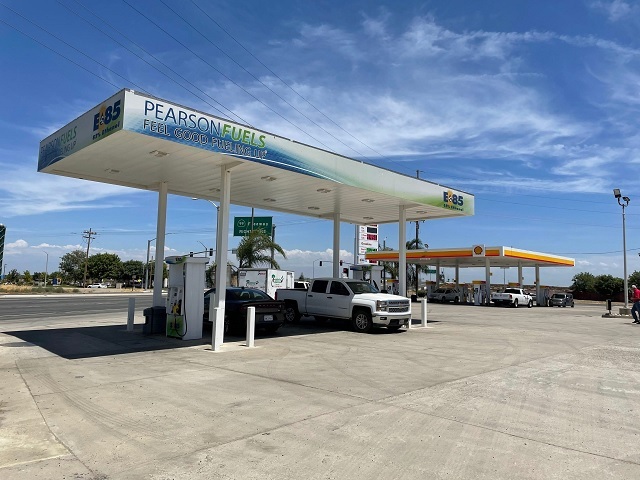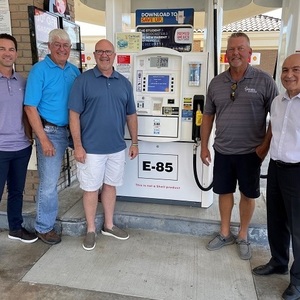State corn checkoffs commit $1.25 to grow E85 in California



SOURCE: Nebraska Corn Board
September 9, 2021
BY Nebraska Corn Board
The Nebraska Corn Board, along with the corn checkoff programs from Kansas and Missouri, will provide California fuel retailers $1.25 million over the next year to increase availability of E85 (an 85 percent ethanol blend). Fuel will be supplied by Pearson Fuels, the largest E85 distributor in California with nearly 250 retail stations located throughout the state.
Growers from the three corn checkoff organizations met with representatives from Pearson Fuels in San Diego in July to discuss potential opportunities to grow E85 demand. California is by far the largest E85 market in the country, accounting for over 40 million gallons in 2020 and is on track to reach 50 million gallons in 2021.
Prior to the group’s meeting in San Diego, growers toured retail sites in Los Angeles, including two locations previously funded by NCB. “These stations are moving a tremendous volume of E85,” said John Greer, NCB District 2 Director. “One station alone would use about 50,000 bushels of corn in the form of ethanol in just a year. The investment is already proving worthwhile for our corn growers.”
Advertisement
Advertisement
Greg Jones, director of business development with Pearson Fuels, says California remains underdeveloped for E85. The state has 39.5 million people but trails both Iowa and Minnesota in total E85 stations.
Jay Schutte, Missouri Corn Merchandising Council Chairman, took part in discussions in San Diego and was impressed with the potential expanded partnership. “Our infrastructure grant dollars, teamed with Pearson Fuels’ marketing and local expertise, will allow us to increase ethanol sales faster in California compared to anywhere else in the country.”
While California’s Low Carbon Fuel Standard incentivizes so-called “zero-emission vehicles” powered by electricity or hydrogen, ethanol has reduced more greenhouse gas emissions than any other fuel, according to data from the California Air Resources Board. “Our ethanol will continue to be a low-carbon, high-octane fuel that offers Californians immediate benefits,” said Kent Moore, Kansas Corn Commission President. “Flex fuel vehicles using cleaner burning and more affordable E85 can be widely deployed there to meet the state’s goals quicker than any other technology.”
Advertisement
Advertisement
California’s battery electric vehicle tally at the end of 2020 was close to 370,000 – only 1.3 percent of all light-duty vehicles on the road. For comparison, more than 1.1 million drivers own flex fuel vehicles. The state still has more than 25 million other cars on the road using non-flex fuel, internal combustion engines. “The ceiling is high for E85,” Greer said, “but FFVs and E85 need to be more widely available.”
Pearson Fuels’ E85 will continue to become a cleaner fuel for California drivers. “Our goal is a completely renewable E85 gallon by replacing gasoline with renewable naphtha,” said Jones. “This is a fuel all Californians could use, especially those who can’t afford substantially higher-priced electric vehicles.”
Related Stories
U.S. fuel ethanol capacity fell slightly in April, while biodiesel and renewable diesel capacity held steady, according to data released by the U.S. EIA on June 30. Feedstock consumption was down when compared to the previous month.
XCF Global Inc. on July 8 provided a production update on its flagship New Rise Reno facility, underscoring that the plant has successfully produced SAF, renewable diesel, and renewable naphtha during its initial ramp-up.
The U.S. exported 31,160.5 metric tons of biodiesel and biodiesel blends of B30 and greater in May, according to data released by the USDA Foreign Agricultural Service on July 3. Biodiesel imports were 2,226.2 metric tons for the month.
The USDA’s Risk Management Agency is implementing multiple changes to the Camelina pilot insurance program for the 2026 and succeeding crop years. The changes will expand coverage options and provide greater flexibility for producers.
EcoCeres Inc. has signed a multi-year agreement to supply British Airways with sustainable aviation fuel (SAF). The fuel will be produced from 100% waste-based biomass feedstock, such as used cooking oil (UCO).
Upcoming Events










